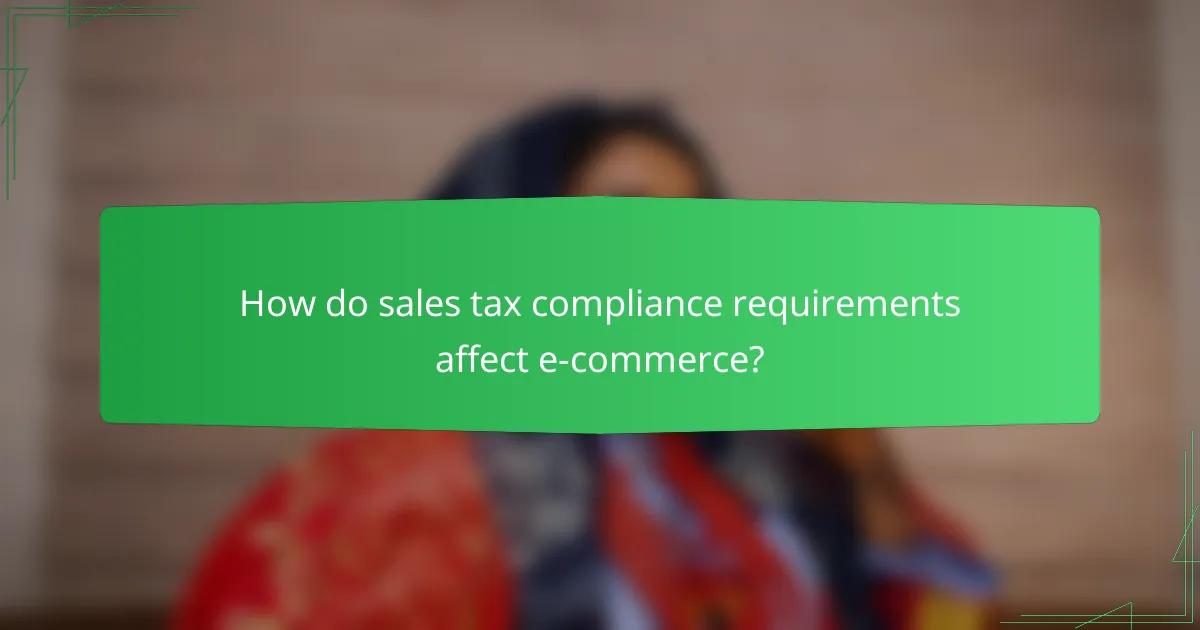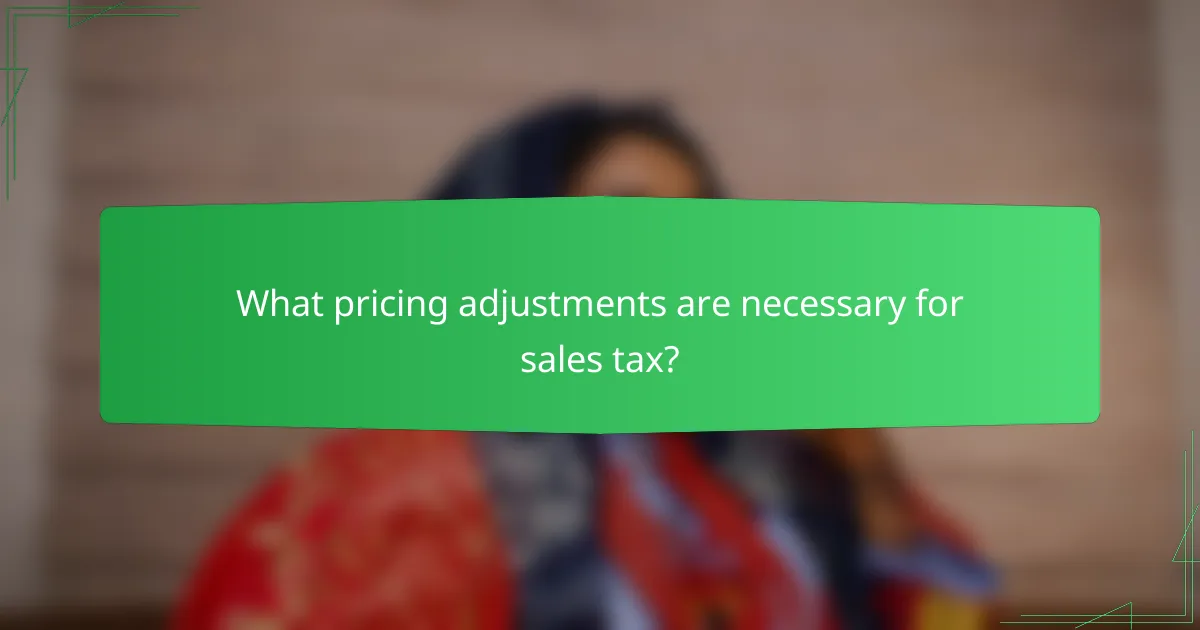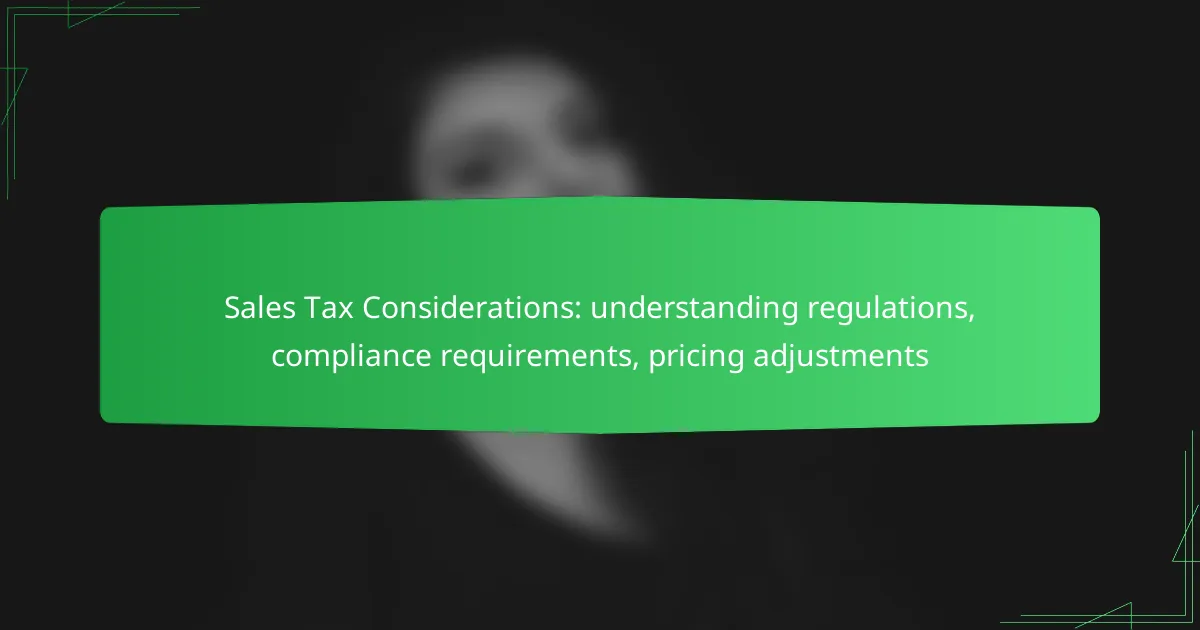Understanding sales tax considerations is essential for businesses to navigate the complexities of regulations and compliance requirements. In the UK, Value Added Tax (VAT) governs most transactions, necessitating proper registration and reporting to avoid penalties. Additionally, businesses must adjust pricing strategies to incorporate applicable tax rates, ensuring transparency and compliance while maintaining customer trust.

What are the sales tax regulations in the UK?
In the UK, sales tax is primarily governed by Value Added Tax (VAT), which applies to most goods and services. Businesses must comply with specific regulations, including registration and reporting requirements, to ensure they collect and remit the correct amount of VAT.
Value Added Tax (VAT) overview
VAT is a consumption tax levied on the sale of goods and services in the UK, currently set at a standard rate of 20%. Certain goods and services may qualify for reduced rates or exemptions, impacting how businesses price their offerings.
Businesses must charge VAT on their sales and can reclaim VAT paid on their purchases, which helps maintain cash flow. Understanding VAT implications is crucial for pricing strategies and overall profitability.
Registration requirements for e-commerce
E-commerce businesses in the UK must register for VAT if their taxable turnover exceeds a certain threshold, which is typically around £85,000. Once registered, they must charge VAT on sales and file regular VAT returns.
Even if turnover is below the threshold, businesses may choose to register voluntarily to reclaim VAT on business expenses. It’s essential to keep accurate records to ensure compliance with HM Revenue and Customs (HMRC) regulations.
Exemptions and reduced rates
Some goods and services in the UK are exempt from VAT or subject to reduced rates. For example, children’s clothing and certain food items are zero-rated, while domestic energy supplies may have a reduced rate of 5%.
Businesses should carefully assess their products and services to determine applicable VAT rates, as misclassification can lead to compliance issues and financial penalties. Consulting with a tax professional can provide clarity on exemptions and ensure proper adherence to regulations.

How do sales tax compliance requirements affect e-commerce?
Sales tax compliance requirements significantly impact e-commerce by dictating how businesses must collect, report, and remit taxes on sales. Understanding these regulations is crucial for avoiding penalties and ensuring accurate pricing strategies.
Filing frequency and deadlines
Filing frequency for sales tax returns can vary based on the state and the volume of sales. Many states require monthly, quarterly, or annual filings, with deadlines typically falling on the last day of the month following the reporting period. For example, if a business has a quarterly filing requirement, it must submit its return by the end of the month following the quarter’s conclusion.
To stay compliant, e-commerce businesses should create a calendar that outlines all filing deadlines. Missing a deadline can lead to penalties, interest charges, and increased scrutiny from tax authorities.
Record-keeping obligations
E-commerce businesses must maintain accurate records of all sales transactions, including invoices, receipts, and any exemptions claimed. Most states require businesses to keep these records for a minimum of three to four years, although some jurisdictions may have longer retention periods.
Effective record-keeping practices include using accounting software that tracks sales tax collected and remitted. Regularly reviewing these records can help identify discrepancies and ensure compliance with local regulations. Businesses should also be aware of specific documentation requirements for tax-exempt sales to avoid potential issues during audits.

What pricing adjustments are necessary for sales tax?
Pricing adjustments for sales tax involve incorporating the applicable tax rates into the final price of goods or services. This ensures compliance with local regulations and helps businesses avoid penalties while maintaining transparent pricing for customers.
Including VAT in product pricing
When including VAT in product pricing, businesses must determine whether to display prices inclusive or exclusive of tax. In many European countries, for example, prices are typically shown inclusive of VAT, which simplifies the purchasing process for consumers. Businesses should clearly communicate whether the listed price includes VAT to avoid confusion.
To adjust pricing for VAT, calculate the total price by multiplying the net price by the applicable VAT rate. For instance, if a product costs 100 EUR and the VAT rate is 20%, the total price would be 120 EUR. This adjustment is crucial for maintaining compliance and ensuring customers understand the final cost.
Impact on profit margins
Sales tax adjustments can significantly affect profit margins, especially for businesses operating on thin margins. When sales tax is included in the price, it can reduce the perceived value of a product if not managed correctly. Companies must balance competitive pricing with the need to cover tax obligations.
To mitigate the impact on profit margins, businesses can consider strategies such as increasing the base price slightly to accommodate the tax or absorbing the tax cost in certain promotions. Regularly reviewing pricing strategies and tax obligations is essential to maintain healthy profit margins while remaining compliant with tax regulations.

How can e-commerce businesses manage sales tax effectively?
E-commerce businesses can manage sales tax effectively by implementing robust systems for compliance and staying informed about regulations. This involves using technology and expert advice to navigate the complexities of sales tax obligations across different jurisdictions.
Using tax compliance software
Tax compliance software automates the calculation, collection, and reporting of sales tax, making it easier for e-commerce businesses to stay compliant. These tools can integrate with existing e-commerce platforms, ensuring that sales tax is applied correctly based on the buyer’s location.
When selecting software, consider features such as real-time tax rate updates, multi-jurisdiction support, and user-friendly interfaces. Popular options include Avalara, TaxJar, and Vertex, which cater to various business sizes and needs.
Consulting with tax professionals
Engaging with tax professionals can provide e-commerce businesses with tailored advice on sales tax regulations and compliance requirements. These experts can help identify tax obligations in different states or countries, ensuring that businesses do not overlook any critical aspects.
It’s advisable to consult professionals who specialize in e-commerce and have experience with local regulations. They can assist in setting up processes for tax collection and filing, helping to avoid costly mistakes and penalties.

What are the consequences of non-compliance?
Non-compliance with sales tax regulations can lead to significant financial and legal repercussions for businesses. Companies may face penalties, fines, and potential legal actions, which can severely impact their operations and reputation.
Penalties and fines
Penalties for failing to comply with sales tax regulations can vary widely depending on the jurisdiction. Businesses may incur fines that range from a few hundred to several thousand dollars, depending on the severity and frequency of the violations.
In addition to monetary penalties, businesses may also be required to pay back taxes owed, often with interest. This can create a substantial financial burden, especially for small businesses that may already be operating on tight margins.
Legal implications for e-commerce
E-commerce businesses face unique legal implications regarding sales tax compliance, particularly when selling across state or national borders. Different jurisdictions have varying rules, and failing to adhere to these can result in lawsuits or additional regulatory scrutiny.
For instance, online retailers may be required to collect sales tax in states where they have a significant presence, known as “nexus.” Understanding these requirements is crucial to avoid legal challenges and ensure compliance with local laws.

What are the best practices for sales tax management?
Effective sales tax management involves regular audits, staying informed about tax law changes, and making necessary pricing adjustments. Implementing these best practices helps ensure compliance and minimizes the risk of costly errors.
Regular audits and reviews
Conducting regular audits and reviews of your sales tax processes is crucial for identifying discrepancies and ensuring compliance. Aim to perform these audits at least annually, but consider more frequent reviews if your business experiences significant changes in sales volume or product offerings.
During an audit, check for common issues such as incorrect tax rates applied, exemptions not documented, or sales tax collected but not remitted. Utilizing software tools can streamline this process and help maintain accurate records.
Staying updated on tax law changes
Tax laws frequently change, making it essential to stay updated on any new regulations that may affect your business. Subscribe to newsletters from tax authorities or industry organizations to receive timely updates on sales tax law changes.
Additionally, consider attending workshops or webinars focused on tax compliance. This proactive approach helps you adapt your sales tax practices promptly, reducing the risk of non-compliance penalties.

What emerging trends are shaping sales tax regulations?
Emerging trends in sales tax regulations are primarily driven by the growth of e-commerce and digital services. Governments are increasingly adapting their tax frameworks to capture revenue from online transactions, leading to new compliance requirements for businesses.
Digital sales tax developments
Digital sales tax developments focus on taxing online sales and services, often targeting large tech companies. For instance, several countries have implemented or are considering a digital services tax (DST) that applies to revenues generated from digital activities, such as advertising and data monetization.
Businesses must stay informed about these changes, as compliance can vary significantly by jurisdiction. For example, the European Union has proposed regulations that could impose taxes on companies earning substantial revenues from EU users, which may require adjustments in pricing strategies.
Global compliance challenges
Global compliance challenges arise from the differing sales tax regulations across countries, making it difficult for businesses to navigate their obligations. Companies operating internationally must understand local tax laws, which can include varying rates, exemptions, and filing requirements.
To mitigate risks, businesses should invest in robust tax compliance software that can adapt to multiple jurisdictions. Regular audits and consultations with tax professionals can also help ensure adherence to evolving regulations and avoid costly penalties.
